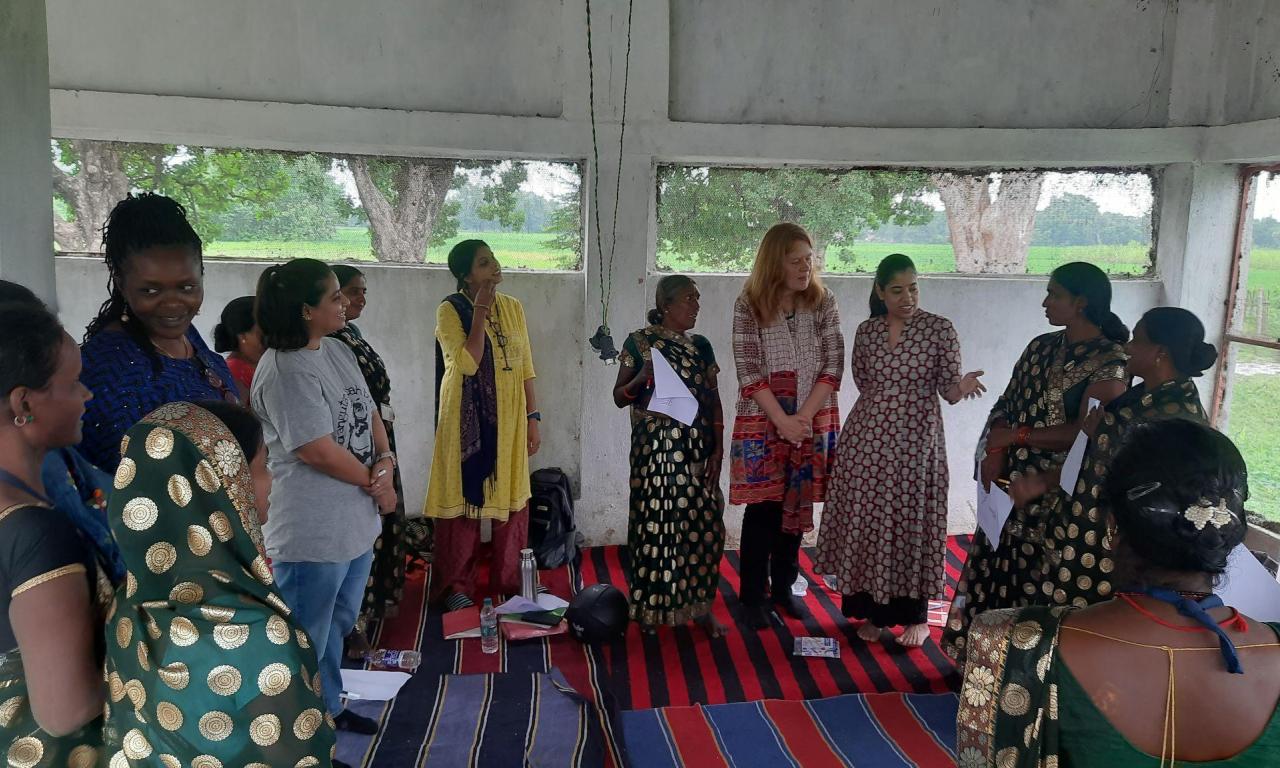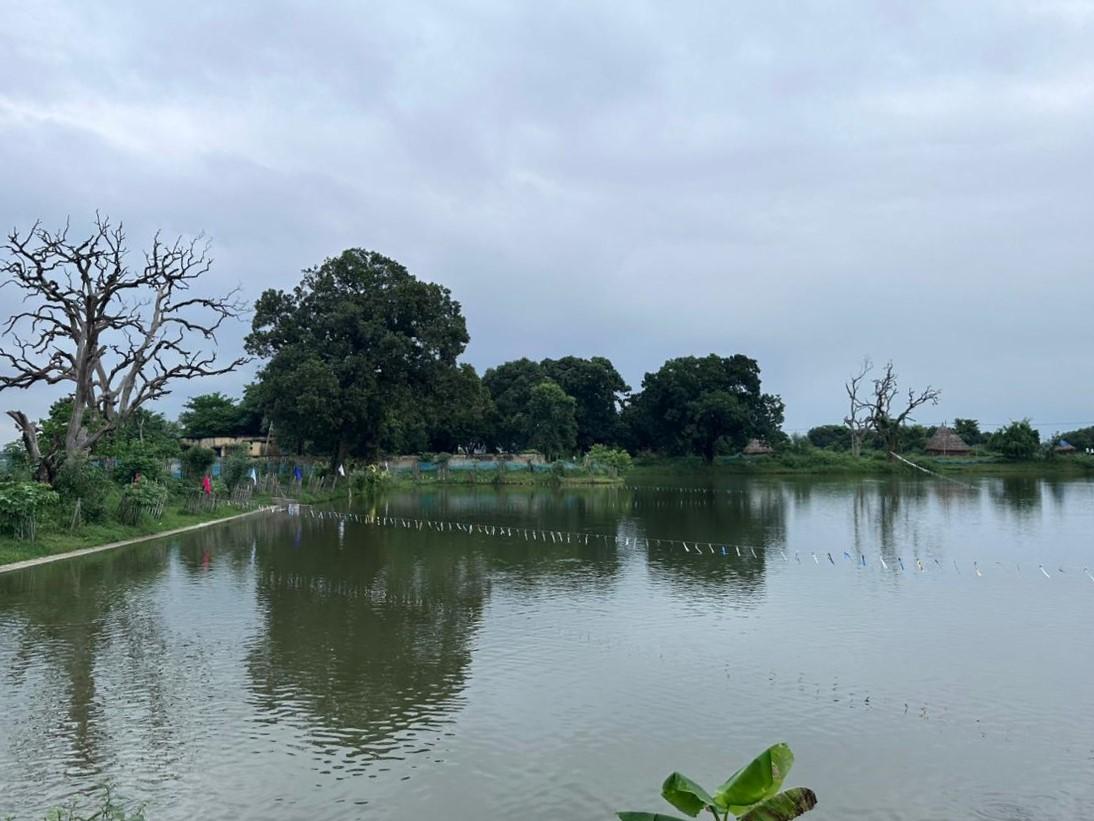
- In a remarkable year-long journey, a group of 11 women in Bihar, India, with no prior experience in fish farming, produced 1,250 kilos of fish, generating a profit of 140,000 Indian rupees (USD 1,681), showcasing a significant step towards women's economic empowerment through aquaculture.
- Despite their economic success, the women's decision-making power over their income remains limited, highlighting the need for gender-transformative approaches and social behavior change communication to address deep-rooted gender norms and empower women fully in their communities and beyond.
In just one year, a group of 11 women who previously had no prior experience in fish farming produced 1250 kilos of fish, turning a profit of 140,000 Indian rupees (USD 1,681), shared equally amongst themselves. This was in August 2023. Two months later by early October, the women doubled the quantity of fish, which was then due for harvesting in two months’ time. Members proudly report that production continues to increase with each successive harvest.
The 11 women are members of an Indian Fish Farmer Producer Group (FFPG) called Jal Jeevan evam Jai JEEViKA Mahila Matasya Utpadan Samuh (meaning Water, Life, and Long Live JEEViKA Women Fish Farmer Producer Group) in Patna district of Bihar state, India. They were introduced to aquaculture as a livelihood opportunity by JEEViKA – Bihar state’s rural livelihood mission.
What were the Results of this Multilateral Partnership?
- In February 2022, the government allocated a pond to the women free of charge for an initial five years, with possible extension if profitability is demonstrated.
- JEEViKA provides regular technical support to women in pond management, complemented by a nutrition training program to encourage more fish consumption at home, alongside sale.
- Continuous monitoring and evaluation mechanisms have been established to measure progress
Behind this hard-won success in just one year is a dedicated labor of love, primarily by the women. The unused community pond allocated to them was in a terrible state. Before stocking with fish seeds in August 2022, the pond required back-breaking labor to painstakingly prepare it for fish farming, including cleaning and maintaining water quality.
Their work was fecilitated by the Government of Bihar. JEEViKA’s network and support have helped to organize the women in Naubatpur block and many others elsewhere into FFPGs to generate income from neglected community assets. JEEVIKA is currently rolling out a program for 300 FFPGs across Bihar by revitalizing neglected community ponds. To date, 103 FFPGs are operational, with 250 more projected over the coming year.
Visiting the Women-Led Group
In October 2023, a Gender Equality and Social Inclusion practice group comprising MSC and WorldFish’s social and economic inclusion team visited the Naubatpur block in India’s Patna district to meet the 11-member women-led group.
During our visit, we asked members about their sources of income before aquaculture and their decision-making power over their aquaculture income.
The women said JEEViKA’s support has brought them recognition and attributed value to them. We asked: is it really true that women do not work? They responded they variously work on their family farms, cultivate crops, and maintain cattle for milk and market it. But they further clarified that neither they themselves nor their family consider these tasks as “work” because farming is considered part of women’s domestic duties. Women also take care of children, cook and clean, and perform other crucial tasks fundamental for family well-being.
We asked the women how they spend their fish-pond income. They unanimously responded that they could not conceive unilaterally spending it as they saw fit. They consider it as household income and not their own. Husbands and in-laws are key in deciding how income is spent, with women rarely consulted.
This finding is not surprising. In part, it is corroborated by India’s 5th National Family Health Survey 2019–2020 report. The report shows a sharp increase in Bihar women holding a bank or savings account from 26% (2015-2016) to 77% (2019-2020). Yet only 1 in 3 women in Bihar report that they can decide how to use their income. This shows women’s financial inclusion and power in financial decision-making are not necessarily achieved merely by dint of having a bank account.
What Next?
Through gender-transformative approaches (GTAs) and social and behavior change communication (SBCC), we should build on what the members of the FFPG are already independently winning for themselves. GTAs and SBCC tools promote awareness, challenge harmful gender norms, and create and nurture an inclusive and empowering environment that uplifts women together with men and foster their holistic well-being.

|
Gender-transformative approaches tackle the root causes of gender inequality, including imbalanced power dynamics, rigid gender norms, harmful practices, and discriminatory policies. GTAs and SBCC would complement JEEViKA’s technical and nutritional training.
To follow up, WorldFish and MSC recently conducted a week-long workshop in Patna, Bihar, on:
- How a gender-transformative lens could be applied to support women-led FFPGs in Bihar;
- Appropriate tools and how these could be integrated with the technical training provided; and
- Bolstering JEEViKA in its gender-equality endeavour.
The workshop discussed and assessed toolkits such as the Gender Action Learning System, the Theory of Planned Change developed by the Helen Keller Institute and Forum Theatre.
Such approaches are crucial as they foster sustained and recurring positive interactions within communities, which will lead to meaningful and lasting positive change in the long run. They are instrumental in ensuring desired behaviors and outcomes become deeply ingrained in the community’s social fabric.
The women we met were demonstrably and justifiably proud of their technical achievements. Still, there was considerable doubt on whether norms could change.
“We shouldn’t fly too high just because now we have some money in hand,” one of the women cautioned. “We should stay within our limits and follow the rules.”
This shows the deeply embedded adverse gender norms that hamper economic gains from translating into women's economic empowerment and increased influence on decisions at home and in the community. Changing norms in any context is a long road, along which we believe GTAs and SBCC would catalyze a considerable degree of change.
To this end, GTA-based training and SBCC tools will now be embedded in MSC's project JSPVAT funded by the Bill & Melinda Gates Foundation, aiming to strengthen fisheries in the state through women’s self-help groups-based FFPGs.
